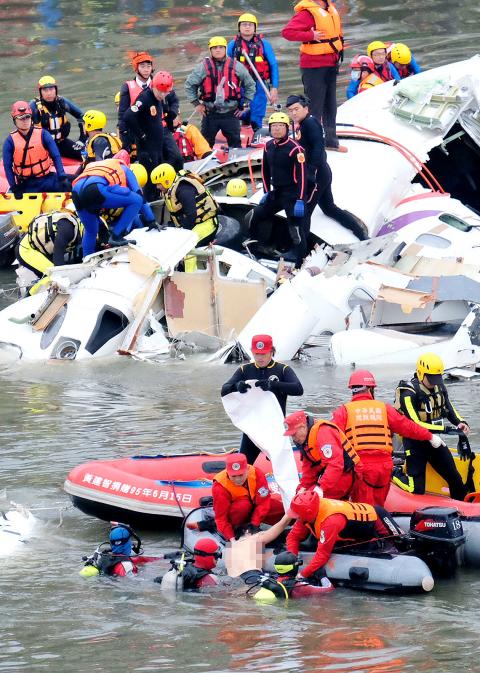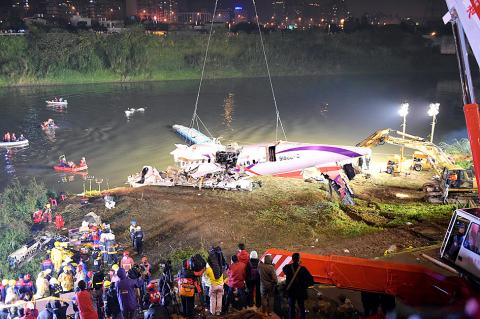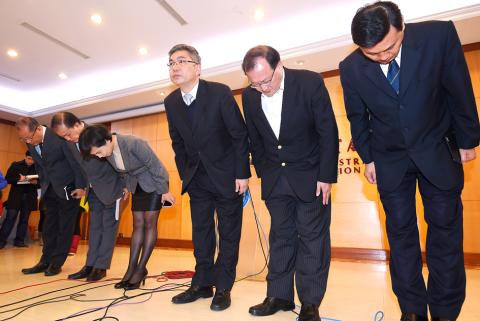A TransAsia Airways (復興航空) airplane flying from Taipei to Kinmen crashed into the Keelung River yesterday, killing at least 25 people, the Civil Aeronautics Administration (CAA) said.
Flight GE235 took off from Taipei International Airport (Songshan airport) at 10:52am, said the agency, which confirmed that it received a “Mayday” signal from the plane’s pilots at 10:53:35am.
Air traffic control personnel tried raising the pilots, but to no avail. Weather data provided by the control tower showed that visibility was 10km when the plane, an ATR 72-600, departed from Songshan airport.

Photo: Sam Yeh, AFP
The weather was quite stable, the CAA said.
The Aviation Safety Council, which is in charge of investigating the cause of the accident, said that it had found the flight data recorder and cockpit voice recorder — also known as the “black boxes” — and would soon start decoding the data.
The data are critical in identifying the cause of the air crash.

Photo: AFP
The plane was carrying 58 people on board: 53 passengers and five cabin crew members.
Thirty-one of the passengers are Chinese tourists, and 27 are Taiwanese. The plane was jointly piloted by 42-year-old Liao Chien-tsung (廖建宗) and 45-year-old Liu Tse-chung (劉自忠), with 4,914 hours and 6,922 hours of flying experience respectively.
Hong Bing-chung (洪炳衷), the copilot, served as an observer during flight as he was training to operate ATR 72-600 aircraft.

Photo: Liao Chen-huei, Taipei Times
Both Liao and Liu are experienced in flying ATR 72-type aircraft, with their flying hours topping 3,400 and 6,500 respectively.
The accident yesterday is TransAsia’s second crash within a year’s time. One of the airline’s ATR 72-500 aircraft crashed on July 23 last year at a village near Magong Airport in Penghu County, killing 48 people and injuring 10 people on board.
TransAsia management bowed and apologized to the victims and their families.
CEO Peter Chen (陳欣德) said that seven of the Taiwanese passengers purchased their tickets at Songshan airport’s check-in counters and only left their ID numbers, adding that the company was still trying to reach the families of the seven passengers.
Ten of the Taiwanese passengers are from Kinmen, he said.
Chen said the Chinese passengers were traveling with the Kaohsiung-based travel agencies Flying Tours (飛揚旅行社) and Sweet Tour (德運旅行社), in cooperation with agencies in Xiamen, China.
TransAsia has asked the travel agencies to help contact the families of the victims, Chen said.
Chen said the company would not speculate on the cause of the air crash, and would fully cooperate with the authorities in the investigation.
The company confirmed that the airplane’s No. 1 engine was replaced with a new one provided by the manufacturer, Pratt & Whitney Canada, when the plane first landed in Macau on its way to Taiwan. The No. 1 engine had only been in operation for 800 hours, the company said.
Chen said the ATR 72-600 aircraft were purchased to replace the company’s ATR 72-500 airplanes as part of its move to upgrade its fleet.
Yu Yi-shi (喻宜式), deputy director of the CAA’s flight standards division, said that Uni Air (立榮航空) has 12 ATR 72-600 planes, while TransAsia has six ATR 72-500s and four ATR 72-600s.
He said that all of the nation’s ATR 72-type airplanes will undergo special inspection in the next two days.
“Because the accident happened with TransAsia’s airplanes, the airline is given one night to complete all the examinations before their aircraft could be cleared to take off on Feb. 5, including engines, propellers. Uni, on the other hand, must finish the same process before Feb. 6,” Yu said.
Information from both the CAA and TransAsia showed that the airline received the aircraft on April 14 last year, with the last maintenance being done on Jan. 26.
Meanwhile, the Environmental Protection Administration (EPA) responded shortly after the crash to address possible fuel leakage.
EPA Department of Environmental Monitoring and Information Management Director-General Chu Yu-chi (朱雨其) said his agency had deployed four survey sites along the section of the river between Nanhu Bridge (南湖大橋) and Minquan Bridge (民權大橋), where the accident took place, to monitor water quality within a 5km stretch along the Keelung River every two hours.
The EPA has also requested help from the Taipei City and New Taipei City governments to deploy two fuel locks under the Rainbow (彩虹橋) and Chengmei (成美橋) bridges to contain possible leakage and driftage, Department of Water Quality senior specialist Wei Wen-yi (魏文儀) said.
Additional reporting by Sean Lin

Taiwan is gearing up to celebrate the New Year at events across the country, headlined by the annual countdown and Taipei 101 fireworks display at midnight. Many of the events are to be livesteamed online. See below for lineups and links: Taipei Taipei’s New Year’s Party 2026 is to begin at 7pm and run until 1am, with the theme “Sailing to the Future.” South Korean girl group KARA is headlining the concert at Taipei City Hall Plaza, with additional performances by Amber An (安心亞), Nick Chou (周湯豪), hip-hop trio Nine One One (玖壹壹), Bii (畢書盡), girl group Genblue (幻藍小熊) and more. The festivities are to

Auckland rang in 2026 with a downtown fireworks display launched from New Zealand’s tallest structure, Sky Tower, making it the first major city to greet the new year at a celebration dampened by rain, while crowds in Taipei braved the elements to watch Taipei 101’s display. South Pacific countries are the first to bid farewell to 2025. Clocks struck midnight in Auckland, with a population of 1.7 million, 18 hours before the famous ball was to drop in New York’s Times Square. The five-minute display involved 3,500 fireworks launched from the 240m Sky Tower. Smaller community events were canceled across New Zealand’s

‘IRRESPONSIBLE’: Beijing’s constant disruption of the ‘status quo’ in the Taiwan Strait has damaged peace, stability and security in the Indo-Pacific region, MOFA said The Presidential Office yesterday condemned China’s launch of another military drill around Taiwan, saying such actions are a “unilateral provocation” that destabilizes regional peace and stability. China should immediately stop the irresponsible and provocative actions, Presidential Office spokeswoman Karen Kuo (郭雅慧) said, after the Chinese People’s Liberation Army (PLA) yesterday announced the start of a new round of joint exercises around Taiwan by the army, navy and air force, which it said were approaching “from different directions.” Code-named “Justice Mission 2025,” the exercises would be conducted in the Taiwan Strait and in areas north, southwest, southeast and east of Taiwan

UNDER WAY: The contract for advanced sensor systems would be fulfilled in Florida, and is expected to be completed by June 2031, the Pentagon said Lockheed Martin has been given a contract involving foreign military sales to Taiwan to meet what Washington calls “an urgent operational need” of Taiwan’s air force, the Pentagon said on Wednesday. The contract has a ceiling value of US$328.5 million, with US$157.3 million in foreign military sales funds obligated at the time of award, the Pentagon said in a statement. “This contract provides for the procurement and delivery of 55 Infrared Search and Track Legion Enhanced Sensor Pods, processors, pod containers and processor containers required to meet the urgent operational need of the Taiwan air force,” it said. The contract’s work would be